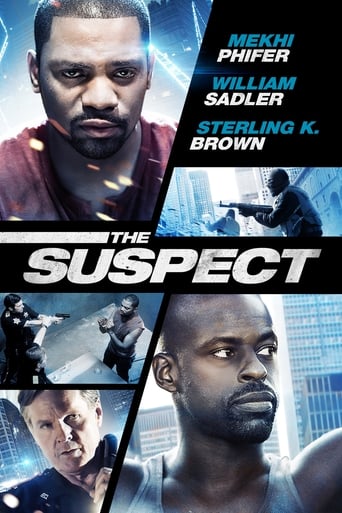NekoHomey
Purely Joyful Movie!
ChicDragon
It's a mild crowd pleaser for people who are exhausted by blockbusters.
WillSushyMedia
This movie was so-so. It had it's moments, but wasn't the greatest.
quincytheodore
The Suspect is one of the movies that has intriguing hook right from the start. It shrewdly fiddles with the timeline back and forth, giving just enough information as it goes and revealing timely revelations later on. Whereas other thrillers might offer aggressive approach, The Suspect bids its time with apt performance by its cast along with the premise of social manipulation.A sheriff in small town arrests a man after bank robbery. This particular suspect only has one identifiable feature that allegedly implicates him, his dark skin. Since it's the farthest thing from CSI, the sheriff must determine if this suspect is indeed the felon. The strange dynamic concept spirals further as there are a lot of questions concerning his behavior, which might not be so accommodating. The movie's biggest strength is its social and psychological aspects, these are easily identifiable to audience as well as meticulously scripted.Acting is fine, with the cast looking beyond their stereotypical roles as they try to outwit each other. Cinematography isn't grandiose as the movie sets almost entirely in rural town. In fact it's exclusively shot only in a few major sets and the rest is ordinary road or outdoor. This is made cleverly into an advantage since the movie probably wouldn't work with bolder setting. The camera-work itself is good, opting more for precision than flair.The change in pace flows adequately well with smart script to guide it. Some scenes pique curiosity while a few others are surprisingly humorous. One drawback from this shifting pace is it can be confusing at times, also towards the end the narration is slightly heavy-handed. The development could be smoother as some of the scenes may be foreshadowing. Nevertheless, the movie maintains a balanced focus through its run time.The Suspect is a different type of thriller, it delivers an alternative and restrained story. If this is a book, which we should never judge by its cover, it would be a pop-up book due to series of trickery it has stored inside.
Gino Cox
This review definitely contains spoilers. "The Suspect" has some very positive qualities. The performances are good throughout, the cinematography is more than adequate with a refreshing lack of jiggly-cam shots which I hate with a passion. For a low-budget independent film, the production values were well above average. The plot is gratifyingly byzantine with a lot of twists, turns and misdirection; however, it has more holes than a wheel of Emmental cheese. • The police procedures seem anachronistic, like procedures from the 1950s. • Modern cash counting machines detect counterfeit bills. • The chances that the switch would not be discovered are practically nil. • Dye packs are used by 75% of American banks. • Even if the money is returned and a generous payment is made to the town to compensate them for the nuisance, a number of laws are broken. Even if the police departments are embarrassed and want to avoid further embarrassment, the odds of the local police, state police and FBI all giving them a pass for several such efforts seem a bit remote. • It seems unlikely that none of the police departments would have discovered that the study hadn't been sanctioned by the university. They claim to have done it several times, but they may have only attempted it twice. • Life insurance policies generally have exclusions for illegal activities. • If the counterfeit bills are good enough to pass inspection by the banks and the police departments, why not use them in Argentina? I enjoyed many aspects of the film, but the implausibilities and incongruities in the screenplay were a major distraction. I wonder if the story might have worked better if set in the 1950s. Although the plot is like Emmental cheese, you don't really notice the holes while you're eating it. If you can shift the rational, cynical, skeptical part of your mind into neutral, it's an enjoyable film. Unfortunately, this film has the same title as a Korean film released the same year, so some of the aggregate review scores are misleading.
Tomas Maly
The first 3/4 of the movie were interesting, and I could have given it a 6 or 7 out of 10, but several things didn't sit well that made the film a far stretch even for a movie..The premise is basic. Two college professors perform a "sociological experiment" in several midwest towns, seeing just how prevalent an undercurrent of racism is. The context of this is staging a bank robbery in very small towns where there are no other African-Americans and one guy rob the bank, then leave the other guy on the side of the road to be found by the police. Then comes an interrogation where the potential prejudice/racism can come out. It becomes justified as an "experiment" and they get pardoned from jail to go on their merry way because 1) the money gets returned and 2) the "experiment" context (ie potential for the scenario being published) leaves the sheriff embarrassed enough to let the suspect go.The first big problem I was bugged by, throughout the entire film, was that if you rob a bank, it's a crime. Even if you give the money back. Even ATTEMPTED robbery is a crime. Obviously, there's no specific evidence of who robbed the bank (wearing masks, long clothing, etc), but the moment your partner shows up at the sheriff with a bunch of money that comes up to the amount stolen from the bank, you'll get arrested. Embarrassment aside, you've committed a crime. Secondly, the theme of racism comes up many times but I fail to see how the behavior is racist. If you happen to show a bit of dark colored skin while robbing a bank and there are no dark skinned people in the town, then a dark skinned fellow is on the side of the road outside of town under ambiguous circumstances, it's a logic conclusion, not racism. Racism would be looking for an African-American suspect and stopping every African-American in town when there is a certain percentage of such. Using overgeneralized identifiable information on a selection of the population. But if a midget robs a bank and there are no midgets who live in town and then you see a midget on the side of the road who can't come up with a clear alibi, then you're going to conclude that the midget did it. That's just logic. It's almost like this movie was trying to overdo the race theme for some cheezy after-school feel-good purpose.Third, in a town where people are genuinely racist, they don't talk as politely as these sheriffs do. They throw out the N-word like it's nothing. These people's behaviors was not racist, it may have been prejudiced to an outsider, but his skin color was not a factor except that it shared identifiable information to the bank robber which no other citizen in the town could identify with. But that's a minor issue.The ending had a double twist. First, the partner never made it to the sheriff station, with the money. So enough of the situation is explained to the sheriff so they end up going on a search for the missing guy and his car. Turns out it ends up over a cliff (are there even cliffs in the midwest?), and the partner is dead. The money is in a bag, and the sheriff insists on the money first, pulled up via winch. They're apparently going to keep the money and say they let this fellow go (surprise!)The problem I have here is that this supposed college professor of psychology never gave question to giving the money (his leverage) to the police. Granted, the money in the bag was counterfeit. But with the winch gone, how would the guy ever get back to safety? It seemed like a long ways down. This somewhat reveals the second twist. Or perhaps there are three twists. The money they return to the bank is counterfeit. Did nobody care enough to check the serial numbers? OK, maybe that doesn't matter. Apparently they are "fake" robbing banks under the pretext of a university sociological experiment so as to acquire enough money for - surprise - the guy's dying daughter (ie black market organs from Argentina). They switch the real money for some counterfeit, and keep the real money.Except this is where the final - and perhaps sappy - twist comes into play. The cops take the supposed bag of money and then douse the guy stuck down a cliff with gasoline, then set everything on fire. Except the guy never bothers to get up. He just sits there, screaming, in the fire. He doesn't seem to care. He doesn't bother moving, or trying to survive. Seems really stupid. And this is where the final sappy twist comes into play. He dies, and he has this life insurance policy, that pays out $8 million that can then pay for his dying daughter's black market organ/surgery! Sappy ending.Maybe I'm the only one who caught it, but I don't see how the ending is plausible AT ALL. First off, the guy was telling the sheriff his FRIEND'S name, ie "Freeman Finch". Yes, they both died, but seems that they got burned. How can anyone be identified? Who would bother informing the insurance company? These fellows manipulated and conned the cops, so it's in their interest to pretend they don't exist. I guess maybe to close the case on the robbery they had to explain that these guys died in a car crash. How the tire popped and lose control made no sense either. What's ironic is that part of the movie's appeal is the race card played against the sheriffs, except it really was played against the movie watchers, because they really were keeping the money.
westsideschl
The premise of investigating prejudice in police behavior by being arrested for a crime and then saying it was all a hoax was a promising plot, except - 1. The plot hook of robbing banks was too overly far-fetched largely because of the safety and legal issues to participants, bank employees, customers, police, pedestrian traffic, etc. should an unexpected event turn tragic. 2. That supposedly a University signed off on this is ludicrous. A poorly designed research method that could have been done in many other and safer ways with more accurate results. That several other police, banks and officials later dismissed their participation and swept it under-the-rug is not very likely. 3. The extreme stereotyping of a bank employee, police and others greatly reduced the credibility of the story which is a shame because the story's premise had potential to be a truly educative tool. 4. The ending created for a dramatic effect was more laughable than real casting yet another nail of make believe into what could have been an impactful script.






